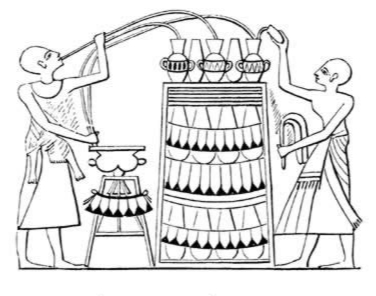Tue Feb 10 18:11:14 PST 2004
Number available: 1 (all scenarios)
 Provides the
Provides theequivalent of Agriculture for 5 areas
|
Number available: 1 (all scenarios)
 Provides the
Provides theequivalent of Agriculture for 5 areas
|
Justification
Evidence
Certainly wine was omnipresent in the ancient world. It is mentioned in one of the earliest books of the Bible as Noah exited the ark and planted a vineyard shortly thereafter. Wine cultivation began in the Neolithic period probably either in what is now northern Iran or in the Pontic region between the Black and Caspian Seas where grapes grow wild. Grape seeds several thousands of years old have been found in ruins of villages. Imagine wine being possibly invented by a woman who left some crushed grapes in a jar and found, several days later, an alcoholic product.
In 1500 BC the Hittites called wine uiian- or uianas, which in Greek became woinos and eventually oinos. In Latin this became vinum which later led to vino, vin, Wein and wine in Italian, French, German and English. Oinos also led to the word oenology or enology, the science of making wine. By the way, the Hittite word also passed into the languages of Armenia, Georgia, Hebrew, Ethiopian and Arabic.
Ancient Egypt made both red and white wines and in the Fertile Crescent there is evidence that wine was stored underground with sealed tops, showing that the effects of air and temperature on wine were already understood. Wine is prominently mentioned in both of Homer's epic poems and Greek wine amphorae have been been found all over the Mediterranean. The Greek cult of Dionysus (and later Bacchus) was devoted to wine. Wine-drinking at banquets was an important part of Celtic culture as well. And the Old Testament frequently mentions both the good and the bad effects of wine. Many New Testament parables make use of wine and vineyards as metaphors as well and of course wine plays a prominent role in Christian ritual.
Significance
Fresh grapes have higher sugar percentages (20-25%) than most fruits and so were very important for the diets of ancient peoples. Dried grapes can range up to 75% sugar. This made grapes an excellent source of high calories which could be easily stored and transported. They were not only eaten alone, but also employed as sweeteners in cooking and boiled to make syrup.
In the form of wine, this fruit of the vine was harder to contaminate than water, important in days when sanitation was difficult and diseases in the water common. Wine contained more alcohol than beer and provided its pleasant effect more quickly as a comfort in those days of difficult winters, wars and slavery. In those days, the new wines also often contained suspended yeast cells, an important source of vitamins.
There were many connoisseurs of wine and a book in Greek on this survives. The Greeks also played a wine-drinking game called kottabos, a dexterity game of hurling wine drops at a target.
Use in Play
In the game, the Enology card can be perhaps be purchased by Egypt or Babylon as these sides, it is widely admitted, have less chance of winning than other sides. Perhaps this card will help them to compete on a more level playing field.
More Recent Evidence
Thematically, Civilization has a number of very realistic features, but some of them are quite wrong. If you want to fix some of them, try the game with the following changes: